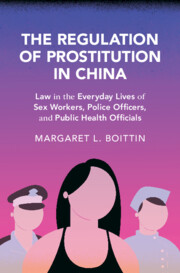 The Regulation of Prostitution in China
The Regulation of Prostitution in China from Part III - The State
Published online by Cambridge University Press: 05 December 2024
This chapter is about how police officers engage with sex workers when they are not enforcing anti-prostitution laws against them. By focusing their enforcement efforts on low-tier sex workers, the police help create a space for the middle tier of China’s sex industry – entertainment venues and their hostesses—to thrive. I find that law enforcement officers engage actively and in myriad ways with the sex industry when they are not focused on arresting sex workers. Some of their actions are purely extractive interactions. Yet other police behavior, while still self-serving, also benefits sex workers. Making sense of police actions in this context requires shifting our framework from exclusively viewing police as powerful figures in relation to sex workers to also viewing them as street-level bureaucrats who are accountable to the local government and the vast police bureaucracy of which they are at the forefront. This approach provides a different perspective on police officers, underscoring their weakness within China’s bureaucratic system rather than their strength in relation to the sex workers. Their vulnerability vis-à-vis the state even affects how they engage with sex workers and underscores conditions under which the job security of frontline police officers in fact depends on a cooperative local sex industry.
To save this book to your Kindle, first ensure [email protected] is added to your Approved Personal Document E-mail List under your Personal Document Settings on the Manage Your Content and Devices page of your Amazon account. Then enter the ‘name’ part of your Kindle email address below. Find out more about saving to your Kindle.
Note you can select to save to either the @free.kindle.com or @kindle.com variations. ‘@free.kindle.com’ emails are free but can only be saved to your device when it is connected to wi-fi. ‘@kindle.com’ emails can be delivered even when you are not connected to wi-fi, but note that service fees apply.
Find out more about the Kindle Personal Document Service.
To save content items to your account, please confirm that you agree to abide by our usage policies. If this is the first time you use this feature, you will be asked to authorise Cambridge Core to connect with your account. Find out more about saving content to Dropbox.
To save content items to your account, please confirm that you agree to abide by our usage policies. If this is the first time you use this feature, you will be asked to authorise Cambridge Core to connect with your account. Find out more about saving content to Google Drive.